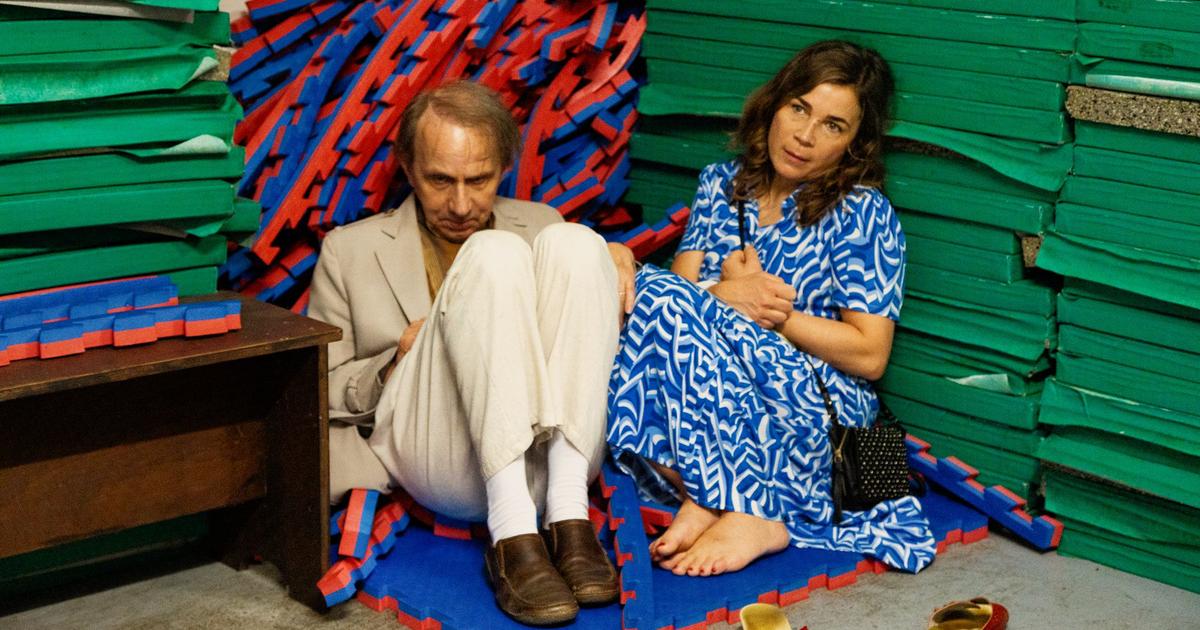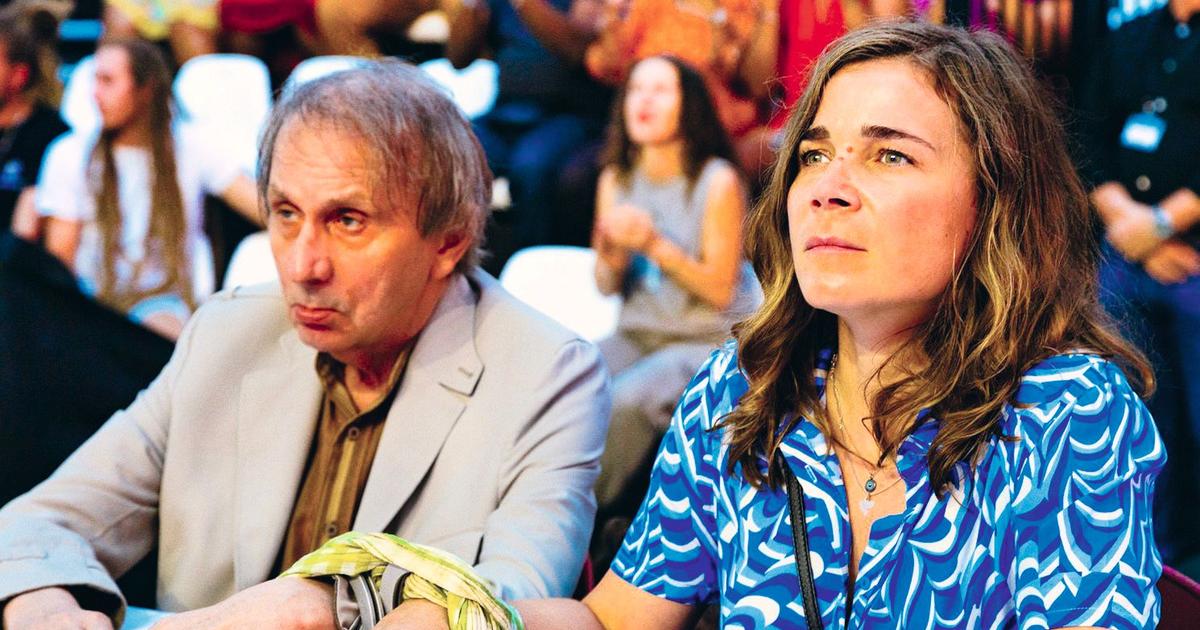Michel Houellebecq's latest tease is that very soon we will all be able to see him having sex in the Dutch experimental film
Kirac 27,
by director Stefan Ruitenbeek.
However, Houellebecq does not want to debut in the world of artistic porn.
Because even though he signed a document to participate in the tape, he now regrets having done it.
So much so that he has tried to stop the premiere in court (Amsterdam and Paris) but having a contract and consenting adults, no one agrees with him.
The film will be broadcast and he feels like "a raped woman", as he has confessed to EL PAÍS.
He calls attention to the fact that the writer is not capable of feeling simply violated as the man that he is and that he feels that he must change gender to experience humiliation or shame.
Could it be that Houellebecq is now a victim of the patriarchy?
Or is it that he would like to be?
Personally, I do not resist the text comment of an interview without waste.
“I feel, although with much less force, more or less what raped women feel.
I have the impression that my body does not belong to me.
I have the impression of feeling ashamed too.
And the third thing is a distrust and a lack of interest in sexual relations, ”she explains.
It is impressive that the
star
French literature does not conceive in its rich imaginary that raped men exist and that it describes what women victims of rape feel, as if they were all the same and the same thing happened to all of them, as if they were concepts instead of people.
On the other hand, I find it suspicious that she uses the image of a raped woman to describe a situation (hers) where someone signs a contract to have sexual relations that she later regrets.
That is to say, Houellebecq is a raped woman who previously consented to, even enjoyed, sex, but later self-determines herself as a raped woman.
A literary license that hides a dangerous prejudice: that of insisting, once again, that it is proper for women to say yes only to later think no.
Or say no to actually
wish yes
Sex and consent, as you know, are a very confusing thing, full of nuances and darkness.
And so, anyone can be a raped woman, including Michel Houellebecq.
Dangerous statement.
Because while sex is ambiguous and desire can be playful and even monstrous, rape victims are not a literary product or a philosophical misunderstanding.
Being a raped woman has nothing to do with changing your mind, but with an abuse committed consciously by the aggressor.
rape victims are not a literary product or a philosophical misunderstanding.
Being a raped woman has nothing to do with changing your mind, but with an abuse committed consciously by the aggressor.
rape victims are not a literary product or a philosophical misunderstanding.
Being a raped woman has nothing to do with changing your mind, but with an abuse committed consciously by the aggressor.
However, it is incredible how throughout the entire interview, the writer pursues the legitimacy of the victim (which he is not) trying to identify with the image of a raped woman.
And embarrassing how to do it he displays his macho imaginary, that where women are political subjects called to suffer sexual abuse from men.
He, who has used and abused male privilege, now also wants to enjoy the recognition that victims of sexist sexual abuse receive.
Thus, his appetite for privilege (including not fulfilling the contracts he signs) makes him the worst version of himself.
It is clear that he is going to write about it and it is clear that for this he is building the status of victim and thus he will be able to denounce later, as a raped woman, the inconsistency of sexual consent.
The question is especially petty if we look at one of the promotional images of the trailer in which Michel Houellebecq, 67 years old and sober silk pajamas à la Hugh Heffner (owner of the Playboy mansion) and the young Jini Van Rooijen appear in bed. , 30 or 40 years younger, with a flowery negligee and a smile from ear to ear, happily seduced by the sexual and intellectual vigor of the writer.
An image of this, that of a very young woman (ideally a minor) irremediably attracted to the intelligence of a man of letters who has been consented to, celebrated and encouraged by a supposed French sexual freedom that Vanessa Springora already denounced in her book
Consent
, where he recounts the relationship he had at the age of 14 with the writer Gabriel Matzneff, 36 years older, with his consent and that of his entire family and cultural environment.
Springora denounces how the French cultural imaginary has spent decades insisting ad nauseam on the ideal representation (film and literary) of unequal relationships traversed by the power of one of the parties (the cultured male) and the innocence and lack of protection of the other ( the naive girl, whose body is at the service of the former's pleasure).
It is not strange then that the porn actor Houellebecq remains faithful to the most rancid French machoeroticism.
In fact, although the French National Prize for Letters says she feels like a raped woman, she never wonders how the young Jini Van Rooijen will feel,
who will appear in the film lying relations with him.
Or how his wife, Qianyum Lysis Li, with whom he also had sex for the film, will feel.
Why doesn't the writer mention the right to privacy of his companions?
Not even feeling like a violated woman is she capable of getting into a woman's skin.
However, in the interview he is seen depressed and afflicted.
But not as a raped woman, but as a misplaced literary star.
Houellebecq has a feeling that, the way he is going, they are not going to give him the Nobel.
Literary recognition is at a low point for sexist discourses and the Hugh Hefner-esque scene clearly damages his social prestige.
He is well aware that the French Nobel Prize has been awarded to a woman, Annie Ernaux, at the ideological antipodes.
Will Houellebecq believe that they have given him the Nobel because women are in fashion or will he be able to imagine (I'm not talking about accepting) that she is a great writer?
We will never know, because her arrogance is such that Houellebecq boasts of not having read Ernaux.
“To be honest, I haven't really read it.
I won't say anything bad about her because I don't know her well."
That is to say,
that what to say something good does not even consider it.
Ernaux?
What Ernaux?
What Houellebecq wants now is to be the new woman of French letters, to be the victim and the privileged male at the same time.
And that is why she announces, in the same interview, that she is going to write her story of a raped woman.
“I will change the name of the people, except me, I will write it in the first person.
I think that, more or less, it is the only thing that I know how to do and it can do me good by helping me to destroy the memory”, she explains.
Houellebecq, in concert.
I will write it in first person.
I think that, more or less, it is the only thing that I know how to do and it can do me good by helping me to destroy the memory”, she explains.
Houellebecq, in concert.
I will write it in first person.
I think that, more or less, it is the only thing that I know how to do and it can do me good by helping me to destroy the memory”, she explains.
Houellebecq, in concert.
Subscribe to continue reading
Read without limits
Keep reading
I'm already a subscriber

/cloudfront-eu-central-1.images.arcpublishing.com/prisa/A7ATNNQ2MBCV5HMJOWJH5GP2DU.jpg)







